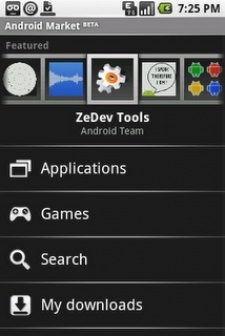The first Android handset goes on sale this week in the US, and with pre-orders for the T-Mobile G1 reportedly strong, Google's new mobile platform looks set for a positive start.
There's been plenty of hype around the G1 and its Android Market store, but interestingly games haven't been quite as high-profile as they were for the iPhone, pre-launch.
Although Glu and Namco have announced their first Android titles, other publishers like EA Mobile, Gameloft and Connect2Media are taking a more cautious approach, committing only to the first quarter of next year to release their first Android games.
Why? It's all about the money. Specifically, publishers won't be able to charge for games or apps sold through Android Market until early next year. If they want to go early, they've got to be free.
That's why Namco's Pac-Man and Glu's Bonsai Blast will both be freebies on Android Market, to be joined by an as-yet unknown number of other games from developers and publishers.
For those two firms, launching free games is clearly an opportunity to build early market share and awareness on Android, and in Glu's case that's doubly so, since it's a chance to give an own-IP game like Bonsai Blast a running start.
Meanwhile, Namco is taking something of a risk in giving away arguably its biggest gaming property for free, but again, the aim is clearly to get some early momentum that can be profited from in 2009.
Android Market is also exciting for smaller developers, who may take to the free approach faster than the big guns. Look again at the App Store, where innovative games like Aurora Feint and Tap Tap Revenge have shown that free doesn't have to mean low-quality.
You can expect online social game firms like SGN to take advantage too the company has been doing significant downloads of its free iPhone games, and will surely take this approach to Android.
There is a risk to all this, though. In the App Store's case, games could be paid for from day one, with the immediate success of Super Monkey Ball and Crash Bandicoot Nitro Kart proving that iPhone users were happy to pay for premium titles.
With Android, that three(ish) month launch window where only free games will be available could foster the perception among consumers that Android games should be free permanently.
The big publishers have been keenly fighting against such perceptions in mobile witness their caution about making their games available through ad-funded services so many will be watching Android Market with a twinge of concern.
Of course, if you subscribe to the view that any raise in awareness for mobile games is a good thing, the Android Market giveaway could inject fresh consumers into the industry, ready to be upsold on premium titles in January.
Opinion: Free Android games are an opportunity AND a risk
No wonder publishers are split in their strategies




















